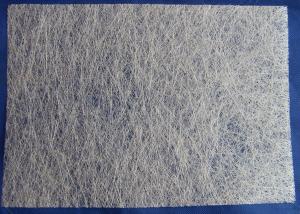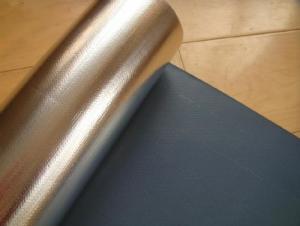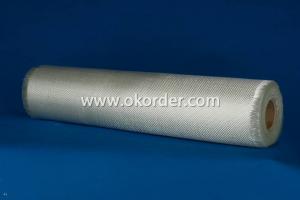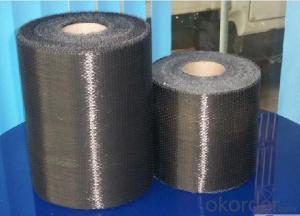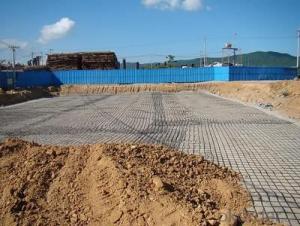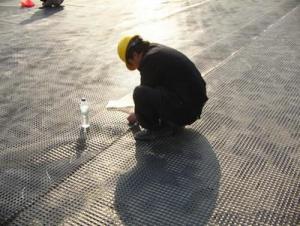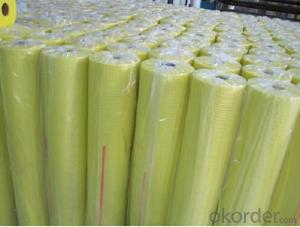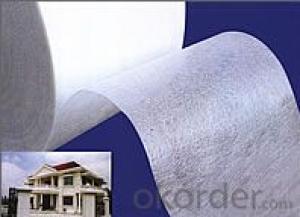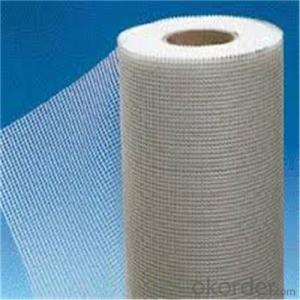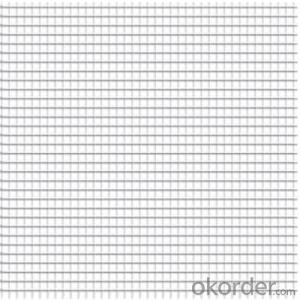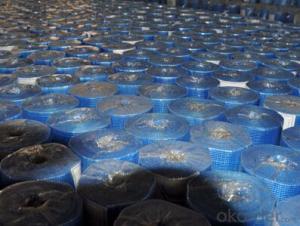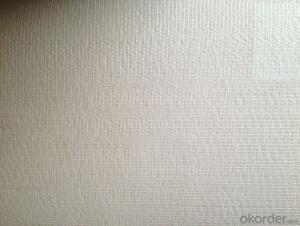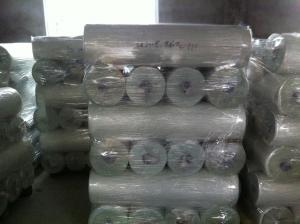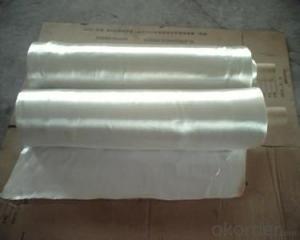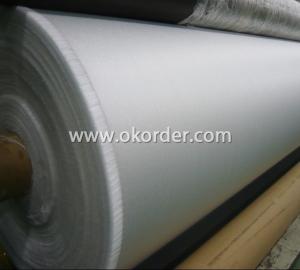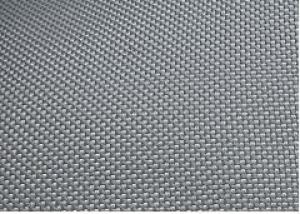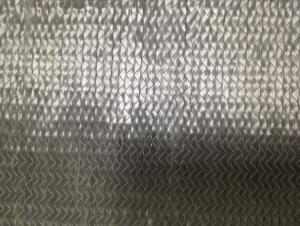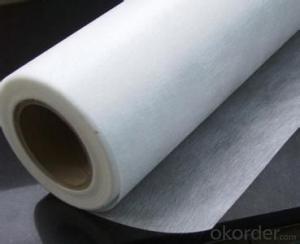High Quality Fiberglass Mesh Fabric Mat for Roofing
- Loading Port:
- Qingdao
- Payment Terms:
- TT or LC
- Min Order Qty:
- 10000 M2 m²
- Supply Capability:
- 50000000 M2 Per Year m²/month
OKorder Service Pledge
OKorder Financial Service
You Might Also Like
Introduction of High Quality Fiberglass Mat for Roofing:
The High Quality Fiberglass Mat for Roofing is usually used as substrates for water-proof roofing materials.It is an ideal substrate material for asphalt roofing rool and singles. The High Quality Fiberglass Mat for Roofing can also act as the lining for roof insulation layers to protect polyester foam insulation from the damaging effect caused by chemical solvent so as to prelong the lifetime.
Data Sheet of High Quality Fiberglass Mat for Roofing:
item | unit | FS90 | FS50 | FS60 | FS60-J30 | FS90-J30 |
linear density of yarn | tex | ----- | ----- | ---- | 34--58 | 34--68 |
space between yarns | mm | ----- | ------- | ----- | 30 | 30 |
area weight | g/m² | 90 | 50 | 60 | 60 | 90 |
bender content | % | 20 | 18 | 18 | 18 | 20 |
tensile strength MD | N/5cm | >330 | >220 | >230 | >260 | >360 |
tensile strength CMD | N/5cm | >260 | >150 | >170 | >160 | >240 |
wet strength | N/5cm | >98 | >60 | >63 | >63 | >988 |
width×length | m×m | 1.0×1500 | 1.0×2500 | 1.0×2000 | 1.0×2000 | 1.0×1500 |
Roll diameter | mm | <117 | <117 | <117 | <117 | <117 |
Specifications of High Quality Fiberglass Mat for Roofing:
High tensile strength:
corrosion and water resistance
easy satyration by bitumen
high porosity
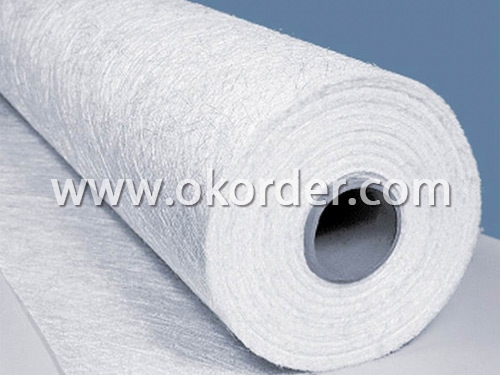
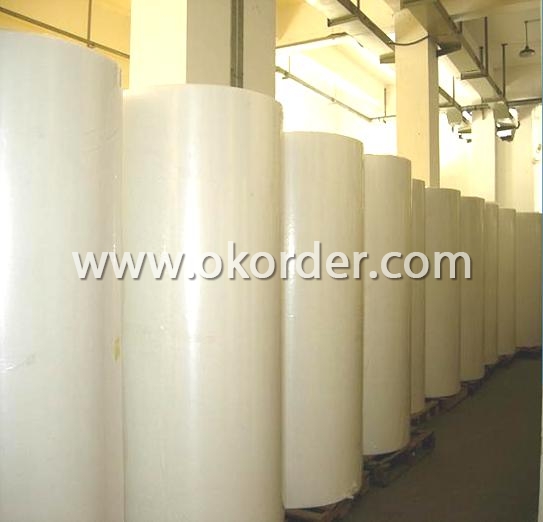
- Q: Can fiberglass fabric be used for heat-resistant curtains?
- Indeed, heat-resistant curtains can be fashioned from fiberglass fabric. Renowned for its exceptional heat resistance qualities, fiberglass can endure soaring temperatures without succumbing to melting or burning. It is a frequently favored option for situations necessitating fire resistance, such as curtains employed in industrial environments or those placed in close proximity to fire hazards. Fiberglass fabric is non-combustible and delivers heat insulation, rendering it an apt material for curtains requiring durability in the face of elevated temperatures.
- Q: Two, fat and PVC paste resin paste into the sizing, coated on glass fiber cloth, so that after baking, how do not shrink?
- Do not grind finer, the particles are too small at room temperature, often because of excessive solvent and paste viscosity high.
- Q: What are the different widths of fiberglass fabric available?
- Fiberglass fabric comes in various widths, catering to different applications and project needs. The typical range of fiberglass fabric widths spans from 1 inch to 60 inches. Nevertheless, it's crucial to acknowledge that suppliers or manufacturers might provide alternative widths depending on their production capabilities and customer requirements. Moreover, custom widths are usually possible upon request. To ascertain the precise widths of fiberglass fabric offered, it is advisable to consult directly with a supplier or manufacturer.
- Q: Is fiberglass fabric resistant to staining?
- Fiberglass fabric generally resists stains due to its composition of fine glass fibers woven together to create a durable and robust material. Its non-porous nature prevents liquids and substances from easily penetrating and causing stains. This quality makes fiberglass fabric highly resistant to various types of stains, including those caused by household items like food, beverages, oil, and grease. Additionally, manufacturers often apply a protective coating or finish to enhance its stain-resistant properties. However, it is important to note that while fiberglass fabric resists staining, it is not entirely impervious to all types of stains. Certain harsh substances, such as chemicals or dyes, may still cause discoloration or staining. Therefore, it is essential to promptly clean any spills or stains on fiberglass fabric to maintain its long-term durability and appearance.
- Q: How is fiberglass fabric used in the production of fire-resistant curtains?
- Fiberglass fabric is used in the production of fire-resistant curtains due to its high heat resistance and non-flammable properties. It acts as a barrier against flames and helps prevent the spread of fire, providing a safety measure in case of emergencies.
- Q: How does fiberglass fabric handle moisture absorption?
- Fiberglass fabric possesses excellent resistance to moisture absorption, thanks to its hydrophobic nature. It does not readily absorb water or moisture due to the composition of fiberglass, which consists of thin strands of glass fibers woven together. These glass fibers are coated with a protective layer or resin, further enhancing the fabric's resistance to water penetration. The hydrophobic nature of fiberglass fabric makes it highly suitable for applications expecting exposure to moisture, such as outdoor or marine environments. Unlike materials like cotton or natural fibers, fiberglass fabric does not become waterlogged or lose its structural integrity when exposed to water. It remains unaffected by swelling, stretching, or deterioration, thereby maintaining its strength and durability over time. Additionally, the low moisture absorption of fiberglass fabric contributes to its resistance against mold, mildew, and rot. Unlike organic materials that provide a favorable environment for the growth of these organisms, fiberglass fabric does not offer a suitable food source or moisture content for their development. This makes it highly suitable for applications where moisture control and prevention of microbial growth are crucial, such as in insulation, construction, or automotive industries. In conclusion, the moisture resistance properties of fiberglass fabric make it an excellent choice for applications expecting exposure to water or moisture. Its ability to repel water and maintain its structural integrity when wet ensures its reliability and durability in various industries.
- Q: How is fiberglass fabric used in insulation?
- Fiberglass fabric is used in insulation by being layered or stuffed between walls, ceilings, and floors to provide thermal insulation. It acts as a barrier, trapping air and preventing heat transfer, thereby reducing energy loss and maintaining desired temperatures in buildings. Additionally, fiberglass fabric is also fire-resistant, making it a safe choice for insulation purposes.
- Q: Difference and characteristics of fluorine glue glass fiber cloth and three yuan ethylene propylene glass fiber cloth
- Fluorine rubber coated glass fiber cloth, its high temperature up to 300 degrees, while also has a certain resistance to chemical corrosion characteristics, as well as excellent weather resistance aging. Three yuan EPDM coated glass fiber cloth, the temperature at 160 degrees Celsius, the use of temperature is not higher than 160 degrees Celsius, is a good substitute for fluorine adhesive tape
- Q: Can I put up wall tiles on the bathroom wall waterproof cloth?
- Water repellent. By mixing cement mortar waterproof agent in the kitchen or bathroom at the grassroots level to do it again, after the dry, use waterproof admixture cement ash in the first layer on the brush layer, which is mainly for the first time will be generated through the dry hole blocked after, there is the root of the pipeline should be carefully brush.
- Q: Is fiberglass fabric resistant to rot and decay?
- Fiberglass fabric boasts a remarkable resistance against rot and decay, owing to its composition of inorganic components like glass fibers and resins. These elements are impervious to biological decomposition, thus rendering fiberglass fabric an unsuitable habitat for the proliferation of mold, fungi, or bacteria, the primary culprits of organic material decay. Furthermore, fiberglass exhibits exceptional moisture resistance, which inhibits the growth of these microorganisms. Consequently, fiberglass fabric proves itself as a durable and enduring material capable of enduring harsh environmental conditions without succumbing to rot or decay.
1. Manufacturer Overview
| Location | Shandong, China |
| Year Established | 1964 |
| Annual Output Value | Above US$ 20 Million |
| Main Markets | 20.00% North America 20.00% South America 10.00% Eastern Europe 10.00% Southeast Asia 10.00% Northern Europe 10.00% South Asia 10.00% Western Europe 5.00% Africa 5.00% Mid East |
| Company Certifications | ISO9001:2000 |
2. Manufacturer Certificates
| a) Certification Name | |
| Range | |
| Reference | |
| Validity Period |
3. Manufacturer Capability
| a) Trade Capacity | |
| Nearest Port | Qingdao Port |
| Export Percentage | 31% - 40% |
| No.of Employees in Trade Department | 10-20 People |
| Language Spoken: | English; Chinese; |
| b) Factory Information | |
| Factory Size: | Above 200,000 square meters |
| No. of Production Lines | Above 10 |
| Contract Manufacturing | Design Service Offered; Buyer Label Offered |
| Product Price Range | High; Average |
Send your message to us
High Quality Fiberglass Mesh Fabric Mat for Roofing
- Loading Port:
- Qingdao
- Payment Terms:
- TT or LC
- Min Order Qty:
- 10000 M2 m²
- Supply Capability:
- 50000000 M2 Per Year m²/month
OKorder Service Pledge
OKorder Financial Service
Similar products
Hot products
Hot Searches
Related keywords
